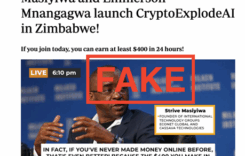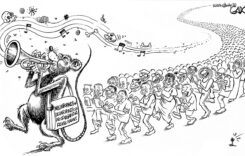Zimbabwe’s July 30, 2018 general elections, will see the return of Western poll observer missions for the first time in nearly two decades.
President Emmerson Mnangagwa has opened the door to observer teams from the United States, the European Union and the Commonwealth, who had been shut out during a lengthy diplomatic stand-off with former President Robert Mugabe’s administration over charges of human rights abuses and electoral fraud.
During the stand-off, Western involvement in Zimbabwe’s elections was limited to diplomatic missions accredited by Harare.
Zimbabwe’s opposition has tabled a raft of electoral reform demands, which include a United Nations supervised election.
However, UN supervised elections are rare and require Security Council or General Assembly resolution.
Here is a fact-file on some international institutions involved in election observation:
The United Nations:
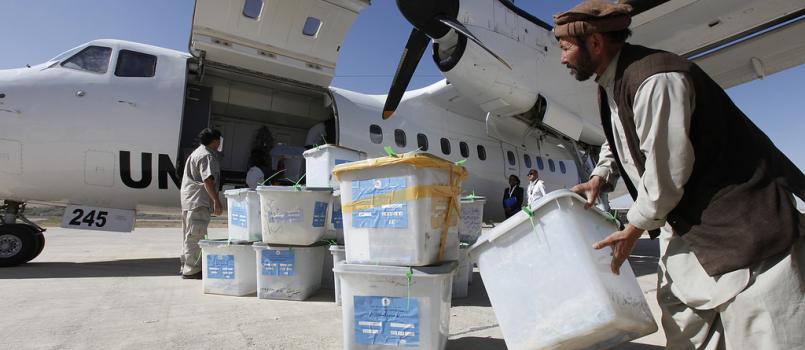
In 1991, the United Nations Secretary-General designated the Under-Secretary for Political Affairs as the focal point for electoral assistance programmes.
Since then, more than 100 countries have requested and have received United Nations electoral assistance.
It is, however, worth noting that United Nations electoral assistance is provided only at the specific request of the Member State concerned, or based on a mandate from the Security Council or General Assembly.
Before assistance is agreed and provided, the United Nations assesses the needs of the Member State to ensure that the assistance is tailored to the specific needs of the country or situation.
During the 1990s, the United Nations observed, supervised or conducted landmark elections and popular consultations in East Timor, South Africa, Mozambique, El Salvador and Cambodia.
More recently, the UN has provided crucial technical and logistical assistance in milestone elections in many countries, including in Afghanistan, Central African Republic, the Democratic Republic of the Congo, Iraq, Nepal, Sierra Leone and Sudan.
Types of UN electoral assistance:
UN electoral support programs are tailored according to the specific needs of each requesting Member State. Although considerable international attention has been given to elections conducted in the context of United Nations peacekeeping missions or other post-conflict settings, most electoral assistance activities take the form of technical assistance in non-mission settings.
The following are examples of some of the various types of electoral assistance provided by the United Nations. These are drawn from several UN electoral policy documents:
Technical Assistance:
Technical assistance is by far the most frequent form of United Nations electoral assistance. It can be defined as the legal, operational and logistic assistance provided to develop or improve electoral laws, processes and institutions. It can cover all, or some, aspects of the electoral process. Technical assistance may be provided on the basis of a request from a Member State, or following a mandate by the Security Council or General Assembly.
Support to creating a conducive environment:
The mandate of Department of Peace-keeping Operations (DPKO) and Department of Political Affairs (DPA) missions often includes provisions related to creating a conducive environment for the implementation of various tasks usually listed in their mandate. In countries where they have such a mandate, they may use their good offices and political role to contribute to creating a conducive environment for the holding of elections. Through their military, police and civilian presences, the DPKO missions may also help stabilise the security situation, which is essential for a conducive environment for elections.
Organisation and conduct of an electoral process:
If the United Nations is mandated to organise and conduct an election or referendum, the organisation assumes the role normally fulfilled by national electoral authorities. In such cases, the UN has full authority over the process. Due to the primacy of the principle of national ownership, this type of assistance is very rarely mandated and is unlikely to be undertaken except in special post-conflict or decolonisation situations, such as Zimbabwe’s 1980 elections, characterised by insufficient national institutional capacity. This type of mandate is only possible via a Security Council or General Assembly resolution.
Certification/Verification:
The term “certification” is widely understood in electoral practice as the legal process by which a national authority approves or ‘certifies’ the results of its own national election. However, on rare occasions, the Security Council or General Assembly may ask the Secretary-General to play a “certification” role. In such cases the United Nations is requested to certify the credibility of all or specific aspects of an electoral process conducted by the national election authority. The United Nations is required to produce a final statement attesting to the election’s credibility. The modalities will vary according to context. UN electoral certification requires a mandate from the General Assembly or the Security Council.
Electoral Observation:
Electoral observation consists of systematic collection of information on an electoral process by direct observation based on established methodologies, often analysing both qualitative and quantitative data. The process of observation usually leads to an evaluative public statement on the overall conduct of the electoral process. UN election observation entails the deployment of a mission to observe each phase of an electoral process and report back to the Secretary-General, who will issue a public statement on the conduct of the election. UN electoral observation, which is very rare, requires a mandate from the General Assembly or the Security Council.
Supervision of elections:
Supervision of elections requires the UN to endorse and approve each phase of an electoral process to attest to the overall credibility of the election. It can require direct involvement in establishing the mechanisms of the election, such as the date, the issuing of regulations, wording of the ballot, monitoring polling stations, counting the ballots, and assisting in the resolution of disputes. Where the UN is not satisfied with the electoral procedures or their implementation in a particular phase, the electoral management body conducting the process is required to act upon UN recommendations and make any necessary adjustments. The progress of the election is contingent upon the UN’s endorsement of each phase. Supervision of elections by the UN is also rare and requires a mandate from the General Assembly or the Security Council.
Panels of Political and/or Electoral Experts:
UN panels entail the deployment of a small team to follow and report on an electoral process. A panel can be an electoral expert monitoring team, composed of experts in such areas as electoral processes or mediation, or a high-level panel composed of eminent persons of political, electoral or mediation profile. Relying on its own observations as well as those of other international and national stakeholders, the panel will provide an independent assessment of the overall political and technical conduct of elections. The assessment is generally provided to the Secretary-General or the UN Focal Point for Electoral Assistance. Unlike observation missions, panels are not necessarily present in the country throughout a process (limiting their visits to strategically important periods) and may not make their findings public. A mandate for such a panel may be provided by the Secretary-General or the UN Focal Point for Electoral Assistance.
Co-ordination of Electoral Observers:
United Nations support to international observers is of two types: (i) Operational Support, and (ii) Coordination of International Observers. Coordination of international observers involves a wide range of activities that can include the provision of logistics and administrative support to the election observation effort and other additional activities such as briefing and facilitation of the deployment of observers, debriefing, etc. This type of support is usually provided to a number of observer groups. This type of support can be provided on the basis of a request from Member States.
The European Union:
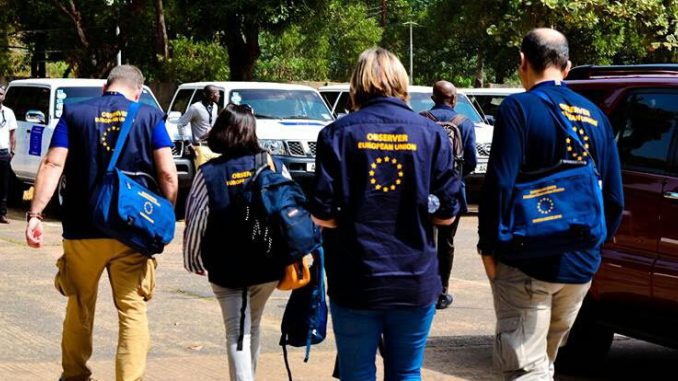
The European Union (EU) and the Southern African Development Community (SADC) sent teams to Harare in March to feel and prepare the ground for observer missions to Zimbabwe’s general elections which must be held by August 22.
The Electoral Observation Mission’s core team, consisting of ten analysts, arrived in Harare on June 6. The team will stay in the country until the completion of the electoral process, as well as preparing a comprehensive final report.
On June 20, the core team was joined by 44 long-term observers who have been deployed across the country.
A further 44 short-term observers will be deployed a few days before election day. A delegation of the European Parliament and diplomats from EU Member States accredited to Zimbabwe will also reinforce the Mission on election day.
When does the EU deploy an election observer mission?
The EU deploys an Election Observer Mission (EOM) at the invitation of the host country.
The European Commission and the European External Action Service (EEAS) selects election observers from candidates proposed by EU Member States.
The European Parliament may also decide to send a separate delegation to observe the elections. This parliamentary delegation is integrated in the EU EOM and works closely with the chief observer and does not issue a separate assessment.
Timing
The EU EOM is normally deployed in country about between 8-6 weeks prior to election day, with long-term observers arriving to assess the preparations for the election at regional level around 5-4 weeks before polling. The short-term observers arrive shortly before election day in order to increase the observation capacities of the mission during polling, counting and the aggregation of results.
A preliminary statement is then presented by the chief observer at a press conference shortly after election day (usually 48 hrs after election day) based on long-term and short-term observations of the entire process.
A final report contains the EOM’s conclusions and recommendations regarding the whole electoral process. It is delivered within a month of the EOM ending its activities on the ground. This report gives guidance for electoral reform and possible future assistance.
Does the mission intervene?
Election observation missions (EOMs) does not interfere in electoral processes.
They only have the mandate to collect and verify information concerning the election process, analyse the observations and then, after the elections, to publish their findings.
As a rule, EU EOMs always operate in a country on the basis of an invitation of the host government.
Key Areas
The assessment of the elections is based on seven key criteria that have been adopted by the European Union in assessing the quality of elections and which are assessed against regional and international standards.
These include:
- The degree of impartiality shown by the election administration
- The degree of freedom of political parties and candidates to assemble and express their views
- The fairness of access to state resources made available for the election
- The degree of access for political parties and candidates to the media, in particular the state media
- The universal franchise afforded to voters
Any other issue which concerns the democratic nature of the election e.g. campaign violence, rule of law, legislative framework, the conduct of polling and counting of votes.
Long-term observers (LTOs) are ideally deployed around one month before election day and remain after the results are officially announced to observe the resolution of electoral disputes. They are located all over the country and observe the unfolding electoral campaign. They also address particular issues, such as the use of public resources by candidates.
Short-term observers (STOs) are deployed to observe the polling day and the early counting of ballots. They are deployed in teams of two. LTO report regularly and prepare the STOs observation programme in their area.
Observation period
Regular meetings are held with election officials at national, regional and local levels, political parties, candidates, civil society and media throughout the country. The elections are assessed against international standards, regional commitments undertaken by the host country and national laws.
The Commonwealth’s election observation

The Commonwealth’s approach to election observation is rooted in the Guidelines for the Establishment of Commonwealth Groups to Observe Elections in Member Countries, which was adopted at the Commonwealth Heads of Government Meeting in Harare in 1991.
The bloc was one of the original signatories to the Declaration of Principles for International Election Observation, agreed at the United Nations in 2005, which is followed by election observers all around the world.
Composition
Commonwealth electoral observation missions are composed of eminent persons from a range of fields, including electoral commissioners and parliamentarians, and legal, gender and human rights and media experts.
Larger observer teams, known as Commonwealth Observer Groups, range from between 10 to 25 members. Usually headed by a former Head of Government or senior political figure as Chair, our observer groups are independent and autonomous, with members drawn from all regions of the Commonwealth.
Smaller observer groups, known as Commonwealth Observer Missions or Expert Teams, may only include two to four independent observers. All teams are supported by a small team from the Commonwealth Secretariat.
Mandate
Commonwealth election observers are given a mandate to observe and consider the factors affecting the credibility of the electoral process as a whole.
Observers will judge whether the elections have been conducted according to the standards for democratic elections to which the country has committed, including national legislation and relevant regional, Commonwealth and international commitments.
Methodology
Before deploying an observer team, the Commonwealth Secretary-General will receive an invitation from a member government or electoral commission.
The observers visit the country ahead of polling day and meet with a broad range of stakeholders, including the electoral commission, major political parties, the media and civil society groups.
After being deployed across the country, Commonwealth observers will assess the pre-election environment, voting, counting and results processes. The observers will then issue an interim assessment after election day and issue a final report which is shared with the government and opposition parties before is made public.
The Carter Centre
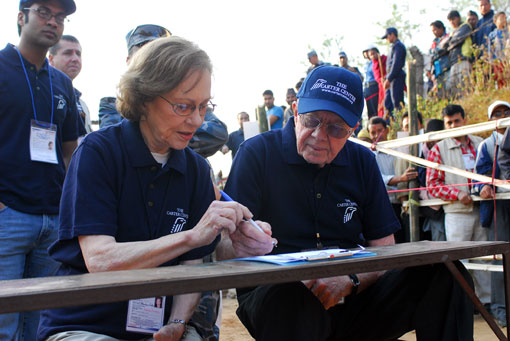
The Carter Centre, set up by former US President Jimmy Carter in 1982, is one of the leading election observer groups from the United States. Its missions are often led by prominent US politicians. Former US Secretary of State John Kerry led the Carter Centre’s observer team to the Kenyan general election in August 2017.
The Carter Centre, which has observed 107 elections in 39 countries in Africa, South America and Asia since 1989, plans to observe Zimbabwe’s 2018 general election and sent a preliminary team to Harare late March.
To ensure a meaningful, nonpartisan role for its election observation activities, The Carter Center insists on being invited by a country’s election authorities and welcomed by the major political parties.
Election observation missions start long before election day, with experts and long-term observers analysing election laws, assessing voter education and registration, and evaluating fairness in campaigns.
On election day, observers assess the casting and counting of ballots. In the days and weeks after the election, observers monitor the tabulation process, electoral dispute resolution, and the publication of final results.
Before, during, and after an election, the Center’s findings are reported through public statements.
Guidelines for election observation
To support impartial, credible election observation, The Carter Center, in cooperation with the U.N. Electoral Assistance Division and the National Democratic Institute, produced the Declaration of Principles for International Observation, which established professional guidelines for election observation. The declaration has been endorsed by more than 50 organisations, which now meet annually to discuss key challenges.
Factsheet compiled by ZimFact staff Nelson Banya & Cris Chinaka, mostly from UN, EU and Commonwealth documents.
Do you want to use our content? Click Here


